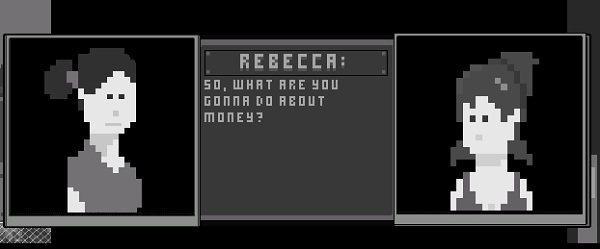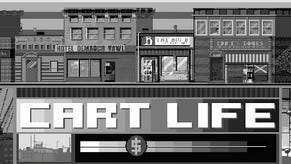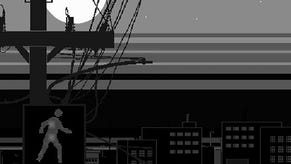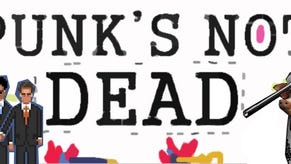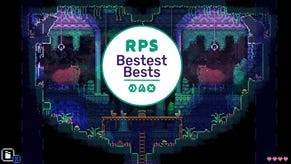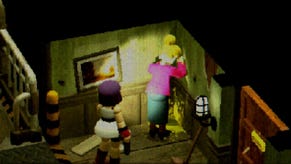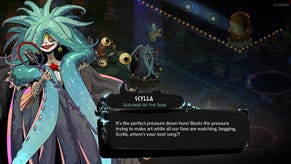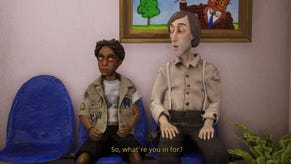Wot I Think: Cart Life
Not half-baked, not a walk in the park
Trying to make every penny count is hard, particularly when those pennies must be earned in time-consuming and will-sapping retail tasks conducted on the sidewalks of an unloving and monochromatic cityscape. Cart Life is a story about people in just such a situation, people who have responsibilities, weaknesses and histories. It's a simulation of life without glitz, glamour or much in the way of good tidings. It's one of my favourite games of recent times. Here's wot I think.
I'm ashamed to say that I missed Cart Life completely when it was released. The only reason I know about it now is because Joel Goodwin of Electron Dance was kind enough to think it may be of interest to me and whoever may be reading this. He was certainly right about the first part.
Let's watch a trailer to give us an idea of what we're getting ourselves into.
The music should be enough to keep you here if nothing else. I was warned that my first experience may lead to frustration but I didn't need to visit twice to realise there was something very special here. Perhaps that's because Joel had already said that this was his favourite game of last year, which was enough of a recommendation to arm me with patience against any foibles I was forced to endure. There's no denying that patience has been required but it's all part of the game, a fundamental element of the complex stories locked in this incredibly special slice of genius.
Forget wot I think for a moment because chances are you haven't heard about Cart Life anymore than I had two days ago, so let's take a moment to ask wot it is. Its creator, Richard Hofmeier, describes it as a retail simulator and the buying and selling of goods is certainly one of the things that it simulates. But it also simulates eating, drinking, sleeping, friendship, family, triumph, loss, crime and punishment. Lots more too. It's a life simulator that has elements in common with that old chunk of cardboard, The Game of Life or the more obscure Jones In the Fast Lane. It's an exploration of normality that is both more artistic and more realistic than anything The Sims has provided over three games and fourteen thousand expansions.
Given that description, it's forgivable to expect an on-rails tale of misery for each of the playable characters (2 in the free version, 3 in the $5 version), with choices limited and only the quality of the visuals, music and writing making the experience worthwhile. However, this is a game about survival, not a series of viginettes in which horrid things happen. Sure, the people in it have hard lives but don't we all at times?
Along with their hardships, the characters in Cart Story have friendships, as well as emotional depth and dreams. They are less cartoon than Sims because their world is more recognisable - I suspect most of us are living in something very much like it at the moment - and rather than simulating a race to the top, this is a doggy paddle for survival that seems doomed to end with treading water, energy gone, only terrible depths below.
If these people were Sims, they'd be the ones who got into the pool right before some bastard sold all the ladders.
That's something I could never bring myself to do to Melanie and Andrus, the two characters I've spent time with. I care about them and am desperately building ladders, trying to guide them out of the water, lending a hand as they choke on the chlorine contamination of the rat race. I don't know if I can and in Andrus' case, all my efforts only seem to push him further into the centre of things, away from solidity and into nightmares that become increasingly difficult to differentiate from waking life. Bleak but believable, Cart Life can feel like misery on tap but if that's true, it also makes the player feel like the bartender, doling out more punishment in the form of existence and hope.
Right now I'm slamming my face against the biggest stumbling block that writing about Cart Life presents. It all sounds utterly depressing and why the hell would anyone want to play it? In a move learned during my toddling years, I'm going to stumble past that block right now and tell you why you should play Cart Life and then tell everyone who might be interested to play it almost immediately afterwards.
OK. We've stumbled. We're on the other side of the block. First off, it's an absolute stunner to look at. These aren't lo-fi visuals masquerading as retro-art, they're lovingly, detailed animations and backdrops that wouldn't look out of place in a cartoon produced in a country you've never heard of, discovered on an odd channel you didn't know existed at an hour that you're not supposed to be awake. To back them, there is a more than generous serving of fantastic music that feels equal parts allusive gesture to gaming past and sometimes-ironic sometimes-melancholic soundtrack to the drear lives that these poor souls plod and slog their way through.
Combined with the well-observed characterisation and the sheer number of different folks to meet, all of the elements combine to provide the conviction of a creation leaning toward documentary yet with the surreal artistry of an inventive animation. Load up the game, have Andrus smoke a cigarette and tell me that isn't one of the most perfect illustrations of an activity you've ever seen in a game.
Andrus is the character I know best and I talk about him the most because his story is simpler to grasp and requires less spoileresque detail than Melanie's. His English is far from perfect and he's alone in the world except for his pet cat. That's easy to grasp.
With Andrus, I found myself going for a drink whenever I packed up my stall for the day. Partly it was convenience; there's a bar just down the road. However, rather pathetically, it's also because I hadn't realised I could go anywhere else. The story starts at Andrus' newspaper stall and then he books into a room for the week with his pet cat as company. When travelling to work the next day, the neighbourhood is presented as a series of nodes on a map. I thought Andrus could only travel to the ones I'd already discovered so instead of heading to a store to stock up on food, I sent him back to work.
He was too hungry to work so I sent him to the pub to eat a packet of crisps, had a beer to set him up for the day and then helped him to work his fingers to the bone. After work - another packet of crisps and another beer. Then home, a conversation with a cat, sleep. Nightmares. Same again tomorrow.
When I realised I could just take a bus to the store I felt like an idiot but I didn't feel like the game had misled me. It seemed acceptable that Andrus didn't quite know how to widen his own horizons yet, or wasn't comfortable doing so. He'd relied on the proximity of the pub because it was safe. But then it became a habit. I'd stop for that morning beer every morning and make sure to have a couple more every evening.
Why was that? Because it broke up the monotony of work and because, sad and true, I was hoping that someone would spark up a conversation in that dark little room. A few words of kindness. The only ones I heard for the first couple of days were from the guy serving me and he was being paid to be friendly. It's lonely out there and lonely people make strange decisions, even when debt and doom are heading toward the door.
All of this living is taking place alongside the actual retail simulation, which involves choosing products, preparing them, setting prices, upgrading stalls, buying licenses and satisfying customers. That's a game in itself, which just happens to be part of the larger game that is maintaining stability, sobriety and solidarity when loved ones become unloved or unloving, or were never there at all.
I'm very aware that it's sounding depressing again. Forget all that - this isn't a game that wants to rub your face in the horror of it all, or to preach at you. Instead, I'd say it's about the importance of human contact, no matter how fleeting, and it's about management of time and money. Behind all of that, it's a series of powerful narratives, great swathes of which are derived from the player's actions. Look deeper still and there's an enormous amount happening, although you'll need to put in the hours to see it all.
When you choose to quit Cart Life a series of faces flash on the screen, so quickly they almost seem like a random medley of features. Play for long enough and you'll start to recognise them. Play longer still and you'll have opinions about them, because they are in there, waiting to become customers, waiting to make your day or ruin it, to offer that kind word or to ignore you as if you were a piece of dogshit on the mud-spattered sidewalk of commerce.
I've said before that the soul of The Sims is consumerism - buying, improving, earning. Cart Life is built on a few hard shots of humanity, mixed in with familiar gaming devices, some sweet, some sour. It burns in the throat and then warms from the inside and, yes, it might leave you feeling a bit uneasy on your feet if you keep going back to it, but it's fantastically put together.
You don't even need to pay a penny to play this for hours, although $5 will get you an extra character who I haven't even mentioned here. Download it immediately. If I'd played this when I should have done, I'd probably have been talking about it again in December because it's a stunning achievement. It may take a little investment to realise how big the game is and there are bugs - some of which are being worked on despite the time since release - but this is a fascinating game that deserves attention. Go play.






